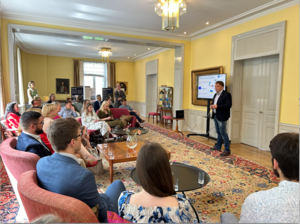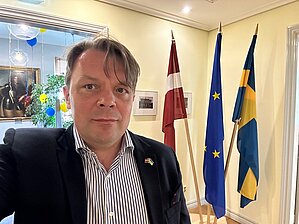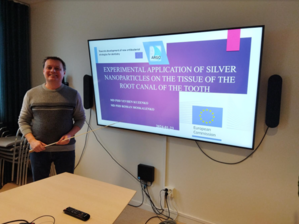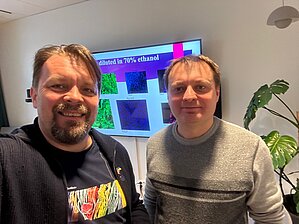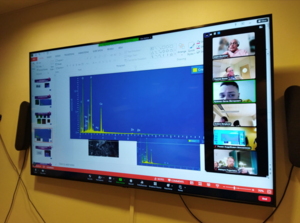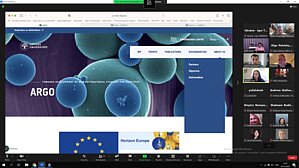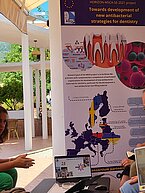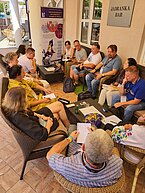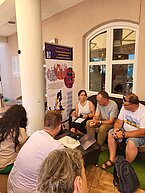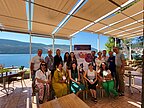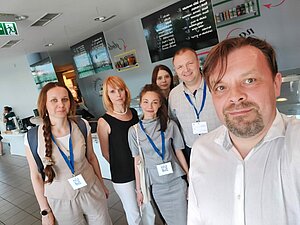The Director of the Institute of Atomic Physics and Spectroscopy, Inga Šīrante, and Senior Researcher, Maksym Pogorielov, participated in a “Roundtable Meeting on Innovation Promotion” co-organized by the Swedish Embassy and the Latvian Council of Science. During this event, Dr. Pogorielov presented a successful collaboration story between the University of Latvia and Umeå University in Sweden. The main focus of his presentation was the implementation of the MSCA-SE project ARGO, “Towards the Development of a New Antibacterial Strategy for Dentistry,” in which the University of Latvia served as the coordinator. In the first year of the project, the consortium has made significant progress in realizing the research plan, leading to the publication of four research papers and the submission of three joint projects. The project aims to develop a new therapy for dental root treatment, a goal that is achievable only through close cooperation with leading researchers from the participating organizations.
On January 23, 2024, a research seminar was organized at Umeå University during the secondment of Prof. Roman Moskalenko (Sumy State University) and Dr. Maksym Pogorielov (University of Latvia) to Umeå Dental Laboratory. The seminar aimed to discuss recent progress in the application of silver nanoparticles for dental root treatment.
Members of the ARGO project presented results from in-vitro experiments, assessing the antibacterial potential and biocompatibility of silver nanoparticles produced by project partner NanoWave (Poland). Additionally, Prof. Yevhen Kuzenko, a representative of the Ukrainian-Swedish collaborative group, delivered a talk on the interaction of nanoparticles with dental tissues. He highlighted the potential applications of these nanoparticles in dentistry, comparing them with existing products on the market.
Based on the seminar discussions, ARGO partners prepared a strategy for an in-vivo experiment on a pig model to evaluate the safety of silver nanoparticles.
Dr. Maksym Pogorielov recently delivered an invited talk at the International Winter School Jean Monet, organized by the National University of Food Technologies in Ukraine. The focus of his presentation was "International Grants Support of Ukraine: Focus on Horizon Europe." This talk was particularly insightful, drawing from Dr. Pogorielov's extensive experience in successful collaborations under the HORIZON-MSCA-SE-2021 projects, specifically ARGO and MX-MAP, involving Ukrainian universities and SMEs.
During his presentation, Dr. Pogorielov highlighted the various opportunities that Horizon Europe projects offer for fostering international and interdisciplinary cooperation. He also shared valuable insights and practical advice on how to effectively search for and partner with other institutions and organizations in these projects. His talk aimed to guide and inspire participants in leveraging Horizon Europe's support for advancing collaborative research and development. He also demonstrated the expertise and tools of Institute of Atomic Physics and Spectroscopy for cooperation within Horizion Europe projects.
Marking eight months of remarkable progress, the MSCA-SE project ARGO, coordinated by the University of Latvia, has achieved significant milestones in the realm of nanoparticle research. This international collaborative project has made notable strides in developing innovative silver nanoparticles, a key area of focus in modern nanotechnology. To ensure continued progress and alignment of goals, an online technical meeting was recently organized by the project coordinator, the University of Latvia. This meeting served as a crucial platform for all partners to present their latest findings in nanoparticle assessment and to outline future research trajectories. Moreover, the meeting also focused on refining the project's communication and dissemination strategies. Discussions revolved around enhancing visibility at both local and international levels, with a particular emphasis on participation in international conferences. This aspect of the project underscores the commitment to sharing knowledge and findings with the broader scientific community, thereby fostering a collaborative spirit in research.
On October 3-4, 2023, an impactful Ukrainian-Swedish contact seminar convened with participation from key figures representing the Ministry of Education and Science of Ukraine, the National Research Fund of Ukraine, the National Erasmus Office of Ukraine, the Swedish Innovation Agency “Vinnova,” the National Contact Center Horizon Europe (Sweden), the Swedish Council of Higher Education, alongside distinguished individuals such as the Ambassador of Ukraine to Sweden, Andriy Plahotniuk, and Sweden's Minister of Education, the esteemed Doctor of Philosophy, Matts Persson.
The comprehensive two-day seminar was primarily dedicated to crucial discussions surrounding education and scientific advancements, with a key focus on fostering deeper scientific, economic, and cultural bonds between the two nations. In addition to the notable presence of high-ranking government officials, the seminar also featured engaging speeches delivered by eminent scientists and successful entrepreneurs.
The seminar notably highlighted Sweden’s prowess in the seamless collaboration between industry and research, showcasing compelling instances of their mutual interaction. The overarching goal was to inspire and encourage collaborative efforts among the participants, commencing from the platform of Horizon Europe, and to illuminate the extensive opportunities for sustained business growth.
The Ukrainian-Swedish research center SUMEYA, represented by Prof. Roman Moskalenko and his Swedish counterpart, Prof. Thomas Boren, showcased the collaborative project ARGO. This initiative operates within the framework of HORIZON-MSCA-SE-2021: 101086441, focusing on "Advancing new antibacterial strategies for dentistry." Furthermore, the partners shared their invaluable experiences of collaboration within scientific projects, which includes two Erasmus+ KA1 initiatives between Sumy State University and Umeå University, and outlined the evolution behind the establishment of the Ukrainian-Swedish research center SUMEYA.
The inaugural technical meeting of the ARGO consortium took place during the 24th Annual Conference on Material Science in Herceg Novi – Yucomat 2023. Partners from the University of Latvia, Sumy State University, Umea University, and Sensorgapha gathered in person, while representatives from NanoWave and UDAB joined the consortium online. The meeting's agenda was centered around the analysis of project progress, the realization of the secondment plan, and discussions regarding dissemination and exploitation strategies.
Following an in-depth discussion, the partners collectively acknowledged significant advancements in the synthesis and evaluation of silver nanoparticles, while also identifying anticipated challenges in the realm of in-vitro assessment. Anna Butsik, representing Sumy State University, presented the latest findings concerning silver ion release from nanoparticles, which she had discovered during her secondment at Umea University.
The partners reached a consensus to actively promote academic exchanges as part of the secondment plan and outlined specific research tasks that the consortium will undertake over the next six months.
Dr. Maksym Pogorielov took part in the international conference “Paths to frontier research: what is just starting at the Jagiellonian University” held at the Faculty of Biochemistry, Biophysics and Biotechnology of the Jagiellonian University in Kraków (June 26-27, 2003). During the conference, he shared the latest results from two projects: CFLA project “Jauna fotoluminescences platforma Listeria monocitogēnu noteikšanai” (No 1.1.1.5/21/A/001) and MSCA-SE project “Towards development of new antibacterial strategies for dentistry” (ARGO) HORIZON-MSCA-2021-SE-01-101086441. During the conference, novel collaborations were launched with leading research groups from Poland and Ukraine.


Endodontic Treatment: Failure due to leakage
On this meeting Prof. Maksym Pogorielov and Prof. Majid Ebrahimi discussed novel methods of endodontic treatment and possible failures and complications. Prof. Ebrahimi demonstrated how to prevent failures and move towards successful outcome. He demonstrated possible application of different nanoparticles in order to insure a bacteria-free environment in endodontic procedures.
Online seminar of Biomedical Research Centre (Sumy State University, Sumy, Ukraine)


ARGO-tooth restorations and treatment failures
On this seminar Prof. Anders Berglund from Umeå University delivered information about dental caries, which nowadays is one of the most common infectious diseases on earth. The main focus of seminar was about the novel strategies of caries treatment and biomaterials applied for teeth restoration. Prof. Berglund provided special focus on silver nanoparticles application and perspective of their application in teeth restoration with aim of recurrent infection prevention.
Online seminar of Biomedical Research Centre (Sumy State University, Sumy, Ukraine)

Experience of Sumy State University in biomaterials research as a leading research university in Ukraine
Doctor Syrgiy Kyrylenko (Sumy State University, Ukraine) demonstrated capacity of Biomedical Research Centre in biomaterials development and assessment. He mentioned that UL and SSU have already participated in the projects that focused on different aspects of nanomaterials exploitation – HE-MSCA-SE-2021-ARGO, project No. 101086441, and HE-MSCA-SE-2021-MX-Map, project No. 101086184. Dr. Kyrylenko demonstrated opportunities in cell culture, bacteriological and animal research in Sumy State University and disclosed the latest findings obtained in ARGO and MX-MAP projects implementation.
Online seminar in the Institute of Atomic Physics and Spectroscopy (University of Latvia, Riga, Latvia)
The Institute of Atomic Physics and Spectroscopy of the University of Latvia, as a leading partner in the project "New Horizon Europe MSCA-SE "Towards the development of new antibacterial strategies in dentistry" – ARGO (project No. 101086441)" organised an opening meeting on 14 and 15 March, which was led by researcher and project manager Dr. Maksym Pogorielov.
The meeting took place in the Hybrid environment, which brought together six project participants from five different countries. Rector of the University of Latvia Prof. Indriķis Muižnieks emphasised the importance of the project in the results of fundamental and applied research. The aim of the project is to develop new antibacterial materials for dentistry, focusing on the creation of a new antibacterial root filling material. Using the additional competences of the participating organizations, the aim of the project is to promote the exchange of research and innovation knowledge between two sectors – academia and business.
The project partners discussed the implementation of the project, the detailed activity plan for the 1st period of the project, as well as the communication and public information plan in active negotiations. EC project supervisor Raquel Jimenez Frias was also remotely connected to the project launch meeting, and was actively involved in discussing unclear issues, pointing out the most important aspects to pay attention to when starting the project implementation.

 Academic Centre
Academic Centre